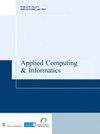Ontological model for the acoustic management in a smart environment
IF 4.9
Q1 COMPUTER SCIENCE, INFORMATION SYSTEMS
引用次数: 0
Abstract
Purpose The Reflective Middleware for Acoustic Management (ReM-AM), based on the Middleware for Cloud Learning Environments (AmICL), aims to improve the interaction between users and agents in a Smart Environment (SE) using acoustic services, in order to consider the unpredictable situations due to the sounds and vibrations. The middleware allows observing, analyzing, modifying and interacting in every state of a SE from the acoustics. This work details an extension of the ReM-AM using the ontology-driven architecture (ODA) paradigm for acoustic management.Design/methodology/approach This work details an extension of the ReM-AM using the ontology-driven architecture (ODA) paradigm for acoustic management. In this paper are defined the different domains of knowledge required for the management of the sounds in SEs, which are modeled using ontologies.Findings This work proposes an acoustics and sound ontology, a service-oriented architecture (SOA) ontology, and a data analytics and autonomic computing ontology, which work together. Finally, the paper presents three case studies in the context of smart workplace (SWP), ambient-assisted living (AAL) and Smart Cities (SC).Research limitations/implications Future works will be based on the development of algorithms for classification and analysis of sound events, to help with emotion recognition not only from speech but also from random and separate sound events. Also, other works will be about the definition of the implementation requirements, and the definition of the real context modeling requirements to develop a real prototype.Practical implications In the case studies is possible to observe the flexibility that the ReM-AM middleware based on the ODA paradigm has by being aware of different contexts and acquire information of each, using this information to adapt itself to the environment and improve it using the autonomic cycles. To achieve this, the middleware integrates the classes and relations in its ontologies naturally in the autonomic cycles.Originality/value The main contribution of this work is the description of the ontologies required for future works about acoustic management in SE, considering that what has been studied by other works is the utilization of ontologies for sound event recognition but not have been expanded like knowledge source in an SE middleware. Specifically, this paper presents the theoretical framework of this work composed of the AmICL middleware, ReM-AM middleware and the ODA paradigm.智能环境下声学管理的本体模型
目的声学管理反射中间件(ReM AM)基于云学习环境中间件(AmICL),旨在使用声学服务改善智能环境(SE)中用户和代理之间的交互,以考虑由于声音和振动引起的不可预测的情况。中间件允许从声学角度观察、分析、修改和交互SE的每个状态。这项工作详细介绍了使用本体驱动架构(ODA)范式对ReM AM进行声学管理的扩展。设计/方法论/方法本工作详细介绍了使用本体驱动架构(ODA)范式进行声学管理的ReM AM的扩展。本文定义了SE中声音管理所需的不同知识领域,这些知识领域是使用本体建模的。研究结果这项工作提出了一个声学和声音本体、一个面向服务的体系结构(SOA)本体以及一个数据分析和自主计算本体,它们协同工作。最后,本文在智能工作场所(SWP)、环境辅助生活(AAL)和智能城市(SC)的背景下进行了三个案例研究。研究局限性/含义未来的工作将基于声音事件分类和分析算法的开发,以帮助不仅从语音中识别情绪,还从随机和单独的声音事件中识别情绪。此外,其他工作将是关于实现需求的定义,以及开发真实原型的真实上下文建模需求的定义。实际意义在案例研究中,可以观察到基于ODA范式的ReM AM中间件的灵活性,通过了解不同的上下文并获取每个上下文的信息,使用这些信息来适应环境并使用自主循环来改进环境。为了实现这一点,中间件在自主循环中自然地集成其本体中的类和关系。原创性/价值这项工作的主要贡献是描述了未来SE中声学管理工作所需的本体,考虑到其他工作所研究的是利用本体进行声音事件识别,但还没有像SE中间件中的知识源那样扩展。具体而言,本文提出了由AmICL中间件、ReM AM中间件和ODA范式组成的本工作的理论框架。
本文章由计算机程序翻译,如有差异,请以英文原文为准。
求助全文
约1分钟内获得全文
求助全文
来源期刊

Applied Computing and Informatics
Computer Science-Information Systems
CiteScore
12.20
自引率
0.00%
发文量
0
审稿时长
39 weeks
期刊介绍:
Applied Computing and Informatics aims to be timely in disseminating leading-edge knowledge to researchers, practitioners and academics whose interest is in the latest developments in applied computing and information systems concepts, strategies, practices, tools and technologies. In particular, the journal encourages research studies that have significant contributions to make to the continuous development and improvement of IT practices in the Kingdom of Saudi Arabia and other countries. By doing so, the journal attempts to bridge the gap between the academic and industrial community, and therefore, welcomes theoretically grounded, methodologically sound research studies that address various IT-related problems and innovations of an applied nature. The journal will serve as a forum for practitioners, researchers, managers and IT policy makers to share their knowledge and experience in the design, development, implementation, management and evaluation of various IT applications. Contributions may deal with, but are not limited to: • Internet and E-Commerce Architecture, Infrastructure, Models, Deployment Strategies and Methodologies. • E-Business and E-Government Adoption. • Mobile Commerce and their Applications. • Applied Telecommunication Networks. • Software Engineering Approaches, Methodologies, Techniques, and Tools. • Applied Data Mining and Warehousing. • Information Strategic Planning and Recourse Management. • Applied Wireless Computing. • Enterprise Resource Planning Systems. • IT Education. • Societal, Cultural, and Ethical Issues of IT. • Policy, Legal and Global Issues of IT. • Enterprise Database Technology.
 求助内容:
求助内容: 应助结果提醒方式:
应助结果提醒方式:


